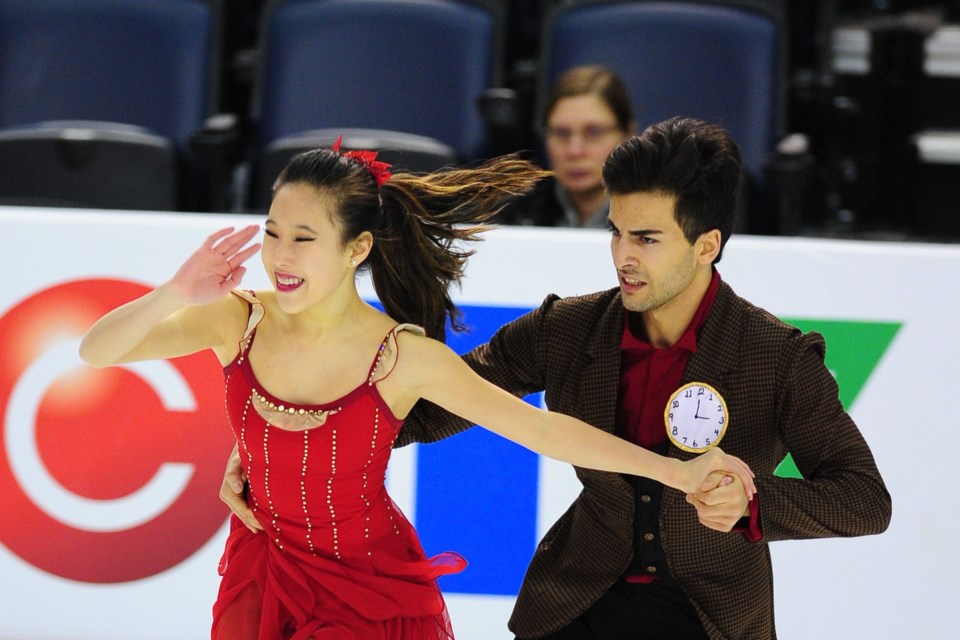Synchronicity doesn’t come easily – especially when you’re dancing on ice.
For Burnaby’s Danielle Wu, her ice dance passion had been cemented with a four-year long partnership of stability and comfort. That is, until the partnership with fellow Burnaby native Spencer Soo ended in 2015.
Ice dancing has no room for the solitary skater. Passionate about her sport, Wu sought someone who could match her intensity, exhuberance and skating style to get back on the national and international competitive sheet.
Thanks to social media and the fellowship of the ice dance community, Wu found her match, in of all places, Italy.
In the time since she first linked arms with Nik Mirzakhani, the ice has become a fun challenge and exciting stage for the softspoken 18 year old. But it means a lot of patience and learning.
“We both, especially with (Nik) coming from Europe, have different skating styles – so it’s not what I’m use to,” Wu told the NOW. “We both have to make compromises: ‘I like how you’re doing that, I want to try doing that’… Of course it’s changing the core of our skating skills so it takes time.
“There’s a lot of patience on both our parts but I think we’re slowly getting there.”
With just over 12 months of training, the pair have established good chemistry, representing Canada two weeks ago at the Junior Grand Prix in Ostrava, Czech Republic, where they placed seventh overall.
“It was a great trip, a great experience. It was bonding for us and bonding with other Canadian skaters. Honestly it was a once-in-a-lifetime experience,” said Wu.
For Mirzakhani, his search for a new partner meant not only learning another skater’s style, but also absorbing a new culture in a foreign country, all while trying to master English.
“It took me a week to understand that we’d keep trying or not, and just trusting the coaches and their work and trusting each other,” Mirzakhani, 20, said. “It helped us to spend this time together, and now we’ve got more connection, it was our first year together and hopefully we get better and better.”
That those coaches were internationally known Megan Wing and Aaron Lowe helped establish confidence in his decision to relocate.
Wu spent the previous four years teamed with Burnaby’s Spencer Soo, reaching such pinnacles as a Canadian novice national title in 2013 and back-to-back fourth place results at the Canadian junior championships.
They also competed at three Junior Grand Prix events, finishing as high as fifth.
When they parted ways, Wu’s love of skating meant she needed to find someone with a similar intensity and passion to compete. And social media proved to be the matchmaker.
“In our sport trying to find a partner is a little like dating. We have an online system where we put out profiles, our previous accomplishments, our height, weight, all that pizzazz,” the Moscrop Secondary alumna said. “So we found each other – well, I messaged him first saying, ‘Hey, I’m looking for a partner, are you interested?’ And he was, and he came from Italy for me.”
Mirzakhani had won the Italian junior ice dance title in 2014 alongside Valentina Gabusi.
The difference between her two dance partners is pretty significant, she notes.
“Spencer was a quiet person, while Nik is the life of the party,” said Wu. “They are both very smooth skaters with great knee bend and lots and lots of power. However, Spencer was very controlled and precise in his skating, whereas Nik has more of a wild and free feel – which is not a bad thing.”
The development of chemistry and synchronicity is one that takes time, said Wing.
“It’s a big challenge,” said Wing, who with Lowe competed at the 2006 Olympics and a string of World championships. “(Soo was) her first partner, so finding a new partner and getting to know each other is a big challenge, never mind the cultural and language elements.
“The keys for them is finding out how to compete and compete the best as a team. When they work together well things go very well. But when they’re a bit inconsistent in training, it shows in the competition.”
The pair have had a handful of competitions to measure their progress, and feel the hard work is paying off.
“We wanted to look strong (in Ostrava) and we wanted other teams to know that we are there, we are going to fight for these two spots at the junior worlds,” said Mirzakhani.
“It’s kind of (like a) dance partner, the guy usually has a very strong lead but at first it was like ‘I’m trying to guess where he wants me to go,’” said Wu. “Over time I’m sure we’ll know where we need to be and where he wants me to be. I’ll try my very best to be there, to make the skating easier.”
Their marks in Ostrava fell short of another Junior Grand Prix assignment, but the duo are focused on the next major tests ahead – regions, provincials and an eye on a top-two showing at nationals.
In the meantime, refining their routine and smoothing their physical chemistry is the focus.
“You sometimes don’t need to speak, you know what this person is wanting. Your communication gets really developed,” Wu said of a perfect partnership. “Having to restart that over again, we’re getting there, slowly. At the beginning it is frustrating, ‘Why doesn’t he just get me?’ I think we’ve found a new appreciation for each other, with the whole language barrier and everything.”



